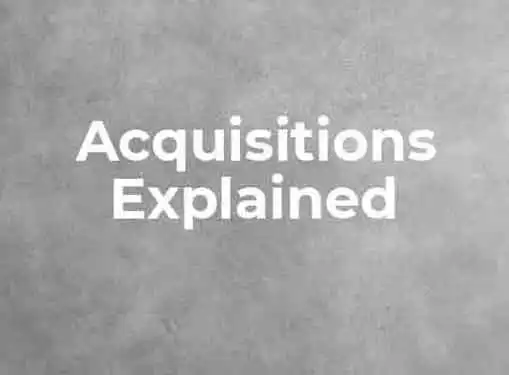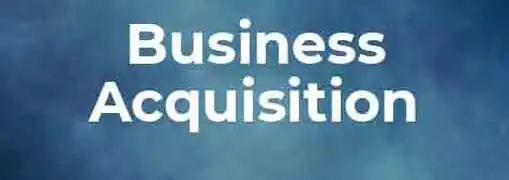Buying a Business
Process of Buying a Business
Written by Domenic Rinaldi for Gaebler Ventures
Understanding the process of buying a business greatly increases your chances of successfully buying a company. We explain the steps involved with buying a business, and why it's important to purchase a business using a systematic approach.
Buying a business is hard work.

It isn't something you do over the course of a long weekend.
Indeed, for many business buyers, finding a good opportunity can take years.
The big mistake that many first-time business buyers make is to cast too wide of a net, looking at every business for sale and then thinking about whether they want to buy the business.
Looking at too many businesses for sale wastes time and energy. It can be a frustrating experience, and it can result in the buyer never finding a good business to buy.
In fact, think about what happens when you approach buying a business unsystematically. A business that would have been perfect for you might go to another buyer, who found the deal sooner. Moreover, you might spend too much time looking at deals and not spend time preparing to make a compelling offer, and then find that you are not ready to buy the business after all of that searching.
So what does it take to buy a business?
Approaching any business task without a process is a mistake. The same is true of buying a business. If you want to successfully buy a business, make sure you follow these key steps in the business buying process:
Step 1: Self-Assessment
Why are you buying a business? This is the first question to ask. Understand your main reasons for purchasing a business. How do you envision it playing out? What activities do you like to do that you will be doing in the business? Are there aspects of owning a business that you are not looking forward to? Many would-be entrepreneurs underestimate the work effort that is required of those who own a business, especially in the early years. For this reason, it's important to make sure at the outset that you have the passion, energy and drive that is needed for entrepreneurial success.
Step 2: Talk to Business Owners
Learn what it's like to run a business by talking to somebody who owns and runs a business. Books and articles like this one are great, but an even better perspective is that of company owners who were in your situation earlier in their lives. Ask them what owning a business is like and how reality differed from their expectations.
Step 3: Make a List of Business Types That You Are Interested In
At this stage, assuming you are still interested in purchasing a business, it's time to come up with your initial list of business types you want to buy. This can be very narrow, e.g. "I want to buy an art supply store," or it can be broad, e.g. "I want to buy a manufacturing company." The general idea is that you want to start to focus in on certain areas, so that your search for a business to buy becomes more efficient.
Step 4: Think Through the Financial Goals
Once you've locked in on buying a business and you have a few business types in mind, it's time to run the numbers. Start by assessing how much money you need to make from the business. It's best to have an "I need" target and an "I want" target. Now, juxtapose your financial goals against your list of target business types. Be sure that the your financial expectations match up well with the types of businesses you are looking at and their typical returns.
Step 5: Get Your Personal Finances In Order
Before you buy a business, make sure you have your financials in order. Analyze your personal balance sheet, including assets and liabilities. Realistically, how much can you use as an investment in buying the business. This, plus your ability to get financing, will determine what size businesses you can buy. Your financials are also necessary for when the seller does his due diligence on you as being a qualified buyer. In fact, you will likely have to submit a personal financial statement to the seller or his advisors early in the business buying process.
Step 6: Prepare Your Credentials
When you look at buying a business, you might think the pressure is on the seller to sell you on the deal. Not so. Sellers are very selective about who they will sell to. After investing so many years on building up their business, they want to make sure it will be in good hands after the new owner takes over. As such, the pressure is on you to impress the new owner, so you'll want to develop a resume that shows you have a good track record and have potential to do well in the new business. By the way, there are others you will need to impress besides the owner. You'll also be dealing with the owner's advisory team and financial lenders who may be involved in the deal.
Step 7: Define the Criteria For Your Buying a Company
With your financials and your credentials ready, you're almost at the point where you can start shopping for a business to buy. Before you do that, however, you'll want to fine tune the parameters of your search to make it as efficient as possible. Lock in on price, target industry and business type, and geographic area. Keep a balance on the breadth of search. As mentioned above, going to broad is inefficient. However, too narrow of a search may also limit your success.
Step 8: Get the Word Out That You Are Looking
You never know where a good lead for a business for sale will come from. It's best to inform your friends, family and business contacts that you are looking, as they may happen to know somebody who is looking to sell the type of business you are looking for. It's particularly important to let your professional advisors (e.g. attorney, accountant, financial planner) know that you want to buy a business. They may know some sellers, and you'll also need their services as you get further along. Of course, all of the contacts mentioned so far pale in comparison to the results you can get from getting in touch with business brokers in your area. They've already got business-for-sale listings in hand and one of them may be just right for you. In addition, they will screen deals for you, only notifying you if a company for sale meets your selection criteria. They do this at no cost to you, believe it or not.
Step 9: Tap Your Advisors
Long before you get to the point where you are ready to make an offer, talk to your attorney, accountant and financial planner to get their insights on the business buying process. Each will bring a distinct perspective on what you need to think about before making an offer. They can then help you to make an intelligent offer and represent you all the way to the transaction's closing. Never go it alone, as you're bound to make some very costly mistakes.
Final Advice on Buying a Business
Following the steps I've outlined above will save you time and money. You'll be much better positioned than other less focused buyers.
As a final bit of advice on buying a business, it's important that move with speed but also with reason. Buying a business that is wrong for you is like sentencing yourself to prison. Similarly, buying a flawed business can put you on a fast path to entrepreneurial woe. So, move quick, but move smart. If you balance the two, you'll soon find yourself owning a business you love that lets you live the life you've always dreamed about.
Domenic Rinaldi is president and managing partner of Chicagoland Sunbelt, a business brokerage firm that focuses on helping people buy and sell businesses in Chicago and the surrounding Midwest area. Rinaldi is a Certified Business Intermediary (CBI) from the International Business Brokers Association and an expert in the business brokerage field. He brings more than 24 years of experience in merger/acquisition, sales, service, marketing and operations to the business brokerage arena. Domenic can be reached by phone at 773-243-1603.
Share this article
Additional Resources for Entrepreneurs





Conversation Board
Do you agree that these are the right steps to take to buy a business? We welcome your feedback, tips and questions.